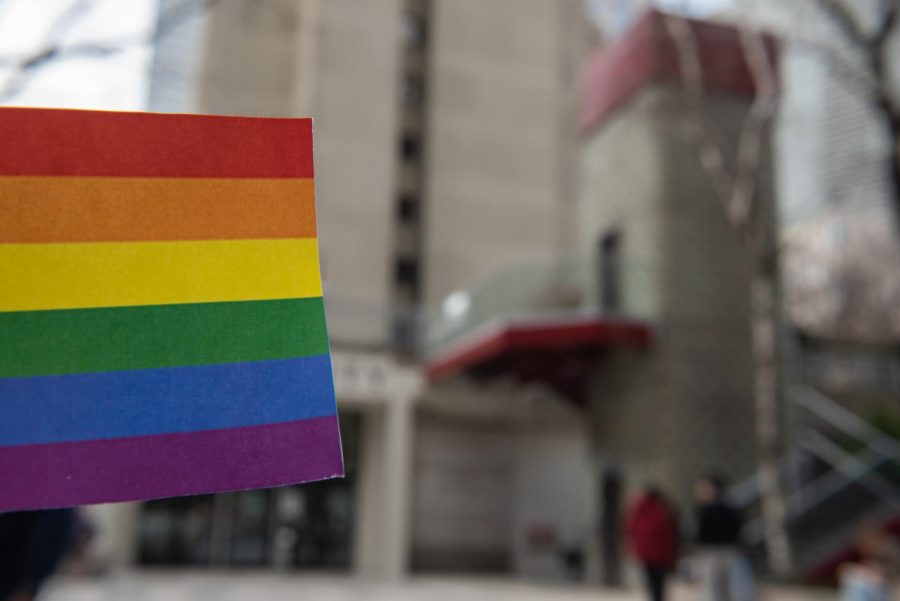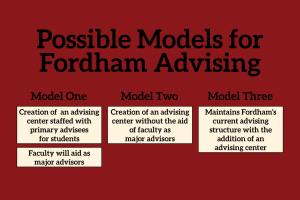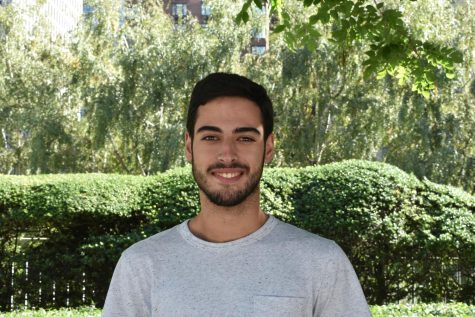First LGBTQ+ Student Wellness Fund Raises Over $60,000
The creator of the fund for Giving Day emphasized the importance of LGBTQ+ representation at Fordham
The recently developed LGBTQ+ Student Wellness Fund aims to provide support for counseling resources, scholarships and research stipends.
April 10, 2022
For the first time, members of the Fordham community were able to donate to the newly active LGBTQ+ Student Wellness Fund on the sixth annual Fordham Giving Day, which was held on March 8.
Out of the $1,540,483 donated to the Fordham Giving Day campaign, a total of $60,840 was gifted to the newly active fund. Joan Garry, Fordham College at Rose Hill (FCRH) ’79 and leader of the initiative to create the wellness fund, contributed to half of that total. She and her wife, Eileen Opatut, pledged to continue matching all gifts made to the LGBTQ+ Student Wellness Fund up to $50,000, including those made past Fordham’s Giving Day.
“Our funding priorities are ambitious, from research stipends to scholarships and emergency funds. But our first order of business is counseling and pastoral care,” Garry said in a video released a day prior to the fund’s launch.
“I believe that the university can be doing much more to create a sense of belonging for LGBTQ students and prospective students.” Joan Garry, FCRH ’79, leader of the initiative to create the wellness fund
The specific division and allocation of funds have yet to be determined because the campaign was recently created. Leading up to its launch, Garry — alongside J. Patrick Hornbeck II, chair of the theology department, and Rafael Zapata, chief diversity officer — prioritized a holistic assessment of what the Fordham experience consists of for LGBTQ+ students currently and what steps can be taken to improve that experience.
“I believe that the university can be doing much more to create a sense of belonging for LGBTQ students and prospective students,” Garry said. “And I believe that it has a responsibility to do so.”
Spencer Balter, Fordham College at Lincoln Center (FCLC) ’24 and secretary of Fordham Lincoln Center’s LGBTQ+ club PRISM, agreed with Garry that Fordham has more work to do.
“The funds could benefit the LGBTQ+ community at Fordham by giving the students more opportunities to feel welcomed, respected and heard, which honestly doesn’t happen often.” Spencer Balter, FCLC ’24
“The funds could benefit the LGBTQ+ community at Fordham by giving the students more opportunities to feel welcomed, respected and heard, which honestly doesn’t happen often,” Balter said.
Garry echoed this sentiment when explaining her reasons for starting the fund. Reflecting on her participation as a speaker last May at Fordham’s Lavender Graduation, the university’s first ceremony celebrating LGBTQ+ students, she noted that the event was the first time in a long time that she felt welcomed by Fordham as an institution.
Because of this feeling, Garry stressed that the donation campaign serves as more than just a means to raise money for the university.
“When Fordham Giving Day decided to spotlight an LGBTQ initiative, it was making a really big public statement to 50,000 members of the Fordham family that LGBTQ people within the Fordham family matter,” she said. “And that feels like a very, very big deal.”
As the face of the fund, Garry received an outpouring of positive responses on Fordham Giving Day from past alumni in tandem with their gifts. She said that she received an email from an alum expressing their gratitude for the fund and increased support at Fordham, as they didn’t feel it was there when they attended.
Brennan Connell, FCRH ’24, shared his experience as a member of the LGBTQ+ community at Fordham.
“I haven’t spent enough time at the Lincoln Center campus to fully grasp an idea of the culture there, but from what I have heard, I feel like Rose Hill could do more to help its queer community on campus because there is a smaller percentage of the population identifying as queer,” he said. “The need is more prevalent here.”
“I want them to see Fordham as a really, really good option, because it was a really good place for me.” Joan Gerry
Connell feels that increased funding for queer students, wherever it goes, is proof of a stronger prioritization of these needs. He also said that the money from the LGBTQ+ Student Wellness Fund could best address these needs by prioritizing mental health and hiring more queer-identifying therapists or counselors.
Kate Goodman, FCLC ’23, shared the same opinion as Connell.
“If the administration wants to support LGBTQ students, they should make sure that their counselors are equipped to deal with mental health issues that pertain to the queer community which would probably mean hiring queer therapists,” they asserted.
Goodman, Connell and Balter all agreed that the LGBTQ+ Student Wellness Fund is a step in the right direction for Fordham.
“It pains me to think that there are LGBTQ high school juniors and seniors out there that are going to pass this university by because they’re going to make assumptions about whether or not they belong,” Garry said. “I want them to see Fordham as a really, really good option, because it was a really good place for me. Hopefully, this campaign can make them see that.”














